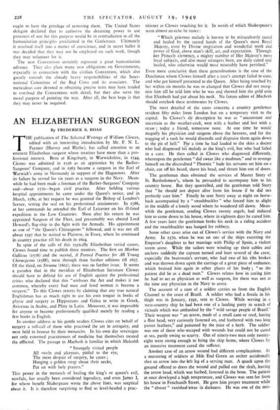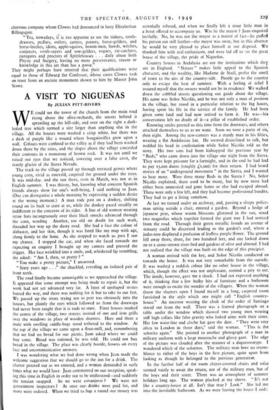AN ELIZABETHAN SURGEON
By FREDERICK S. BOAS
THE publication of The Selected Writings of William Clowes, edited with an interesting introduction by Mr. F. N. L. Paynter (Harvey and Blythe), has called attention to an eminent Elizabethan surgeon whose treatises have more than a pro- fessional interest. Born at Kingsbury, in Warwickshire, in 1544, Clowes was admitted in 1556 as an apprentice by the Barber- Surgeons' Company, and in 1563 became a surgeon in the Earl of Warwick's army in Normandy in support of the Huguenots. After its failure he served for six years as a surgeon in the Navy. Mean- while he had been made a freeman of the Barber-Surgeons' Company and—about 157o—began civil practice. After holding various hospital appointments he came under the Queen's notice, and in March, 158o, at her request he was granted the Bishop of London's licence, setting the seal on his professional attainments. In 1586, at her commands he attended the Earl of Leicester on his ill-fated expedition in the Low Countries. Sbon after his return he was appointed Surgeon of the Fleet, and presumably was aboard Lord Howard's flag-ship in the fight with the Armada. His appointment as one of " the Queen's Chirurgeons " followed, and it was not till about 1597 that he retired to Plaistow, in Essex, where he continued in country practice till his death in 1604.
In spite of the calls of this typically Elizabethan varied career, Clowes found time to publish three treatises. The first on Morbus Gallicus (1576) and the second, A Proved Practice for All Young Chirurgeons (1588), went through three further editions till 1637. Of the third, on Struma (1602), there was no further issue. It seems a paradox that in the meridian of Elizabethan literature Clowes should have to defend his use of English against the professional critics who declared that this "embases the Art and makes it too common, whereby every bad man and lewd woman is become a surgeon." To this Clowcs retorts by claiming that any true natural Englishman has as much right to use his own tongue in books of physic and surgery as Hippocrates and Galen to write in Greek, Avicenna in Arabic, and Pliny in Latin. Moreover, it was impossible for anyone to become professionally qualified merely by reading a few books in English.
In another address to his gentle readers Clowes cites on behalf of surgery a roll-call of those who practised the art in antiquity, and were held in honour by their monarchs. In his own day sovereigns not only esteemed practitioners of medicine but themselves treated the afflicted. The passage in Macbeth is familiar in which Malcohil " Strangely visited people All swoln and ulcerous, pitiful to the eye, The mere despair of surgery, he cures ; Hanging a golden strap about their necks, Put on with holy prayers."
This power in the monarch of healing the king's or queen's evil, scrofula, has usually been considered legendary, and even James I, for whose benefit Shakespeare wrote the above lines, was sceptical about it. It is therefore surprising to find so level-headed a prac- titioner as Clowcs vouching for it. In words of which Shakespeare's seem almost an echo he states : " Which grievous malady is known to be miraculously cured and healed by the sacred hands of the Queen's most Royal Majesty, even by Divine' inspiration and wonderful work and power of God, above man's skill, art, and expectation. Through her Princely clemency, a mighty number of Her Majesty's most loyal subjects, and also many strangers born, are daily cured and healed, who otherwise would most miserably have perished." Even more conclusive than these generalisations is the case of the Dutchman whom Clowes himself after a year's attempt failed to cure. and who got himself presented to the Queen. After being touched by her within six months he was so changed that Clowcs did not recog- nise him till he told him who he was and showed him the gold coin that Elizabeth had put about his neck. No future editor of Macbeth should overlook these testimonies by Clowes.
The most detailed of the cases concerns a country gentleman resident fifty miles from London but on a temporary visit to the capital. In Clowes's sly description he was as " unconstant and uncertain as the weather-cock, won with a feather and lost with a straw ; today a friend, tomorrow none. At one time he would magnify his physician and surgeon above the heavens, and for the wagging of a rush he would discredit and dispraise them again down to the pit of hell." For a time he had lauded to the skies a doctor who had diagnosed hg malady as the king's evil, but who had failed in a cure. He then called in Clowes who diagnosed differently, whereupon the gentleman " did swear like a madman," and to revenge himself on the discredited " Phoenix " bade his servants set him on a chair, cut off his beard, shave his head, and thrust him out of doors.
The gentleman then obtained the services of Master Story of St. Bartholomew's, whom he persuaded to accompany him to his country house. But they quarrelled, and the gentleman told Story that " he should not depart alive from his house if he did not perfectly cure him." Finally he sent Story away at night on horse- back accompanied by a " swashbuckler " who forced him to alight in the middle of a lonely wood where he wandered till dawn. Mean- while the gentleman, sending Clowes twenty angels, had induced him to come down to his house, where in eighteen days he cured him. A few years later the gentleman broke his neck in a riding accident and the swashbuckler was hanged for robbery.
Some other cases arise out of Clowes's service with the Navy and Army. In 1570, when he was on one of the ships escorting the Emperor's daughter to her marriage with Philip of Spain, a violent storm arose. While the sailors were winding up their cables and anchors suddenly the capstan turned and hurt several of the crew, especially the boatswain's servant, who had two of his ribs broken and was thrown down upon the carriage of a great piece of ordnance, which bruised him again in other places of his body ; " so the patient did lie as a dead man." Clowes relates how in curing him he had to act as physician as well as surgeon, for there was not at the time any physician in the Navy to assist.
The account of a cure of a soldier carries us from the English Channel to the coast of Brazil. A soldier who had a fistula in his thigh was in January, 1591, sent to Clowes. While serving in a west-country ship he had been one of a landing party in search of victuals which was ambushed by the " wild savage people of Brazil."
Their weapon was " an arrow, made of a small cane or reed, having a flint head, very curiously fastened on, and feathered with two long parrot feathers," and poisoned by the juice of a herb. The soldier was one of those who escaped with wounds but could not be cured at sea, partly owing to scurvy. Out of ninety-two men only twenty- eight were strong enough to bring the ship home, where Clowes by an intensive treatment cured the sufferer.
Another case of an arrow wound had different complications. At a mustering of soldiers at Mile End Green an archer accidentally shot an arrow into the kft leg of a serving man. A quack upon the ground offered to dress the wound and pulled out the shaft, leaving the arrow head, which was barbed, fastened in the bone. The patient at once developed a high temperature, and Clowcs was sent for from his house in Fenchureh Street. He gave him proper treatment while the " abuser " vanishedtwav in darkness. He was one of the mis- chievous company whom Clowes had denounced in lusty Elizabethan Billingsgate. " Yea, nowadays, it is too apparent to see tin tinkers, tooth- drawers, pedlars, ostlers, carters, porters, horse-gelders, and horse-leeches, idiots, apple-squires, broom-men, bawds, witches, conjurers, sooth-sayers and sow-gelders, rogues, rat-catchers, runagates and proctors of Spittichouses . . . daily abuse both Physic and Surgery, having no more perseverance, reason or knowledge in this art than has a goose."
They might perhaps have retorted that their qualifications were equal to those of Edward the Confessor, whose cures Clowes took on trust from an ancient monument shown to him by Master John Stowe.



































 Previous page
Previous page